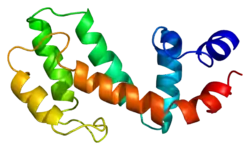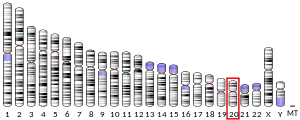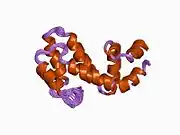RGS19
Regulator of G-protein signaling 19 is a protein that in humans is encoded by the RGS19 gene.[5][6]
| RGS19 | |||||||||||||||||||||||||||||||||||||||||||||||||||
|---|---|---|---|---|---|---|---|---|---|---|---|---|---|---|---|---|---|---|---|---|---|---|---|---|---|---|---|---|---|---|---|---|---|---|---|---|---|---|---|---|---|---|---|---|---|---|---|---|---|---|---|
 | |||||||||||||||||||||||||||||||||||||||||||||||||||
| |||||||||||||||||||||||||||||||||||||||||||||||||||
| Identifiers | |||||||||||||||||||||||||||||||||||||||||||||||||||
| Aliases | RGS19, GAIP, RGSGAIP, regulator of G-protein signaling 19, regulator of G protein signaling 19 | ||||||||||||||||||||||||||||||||||||||||||||||||||
| External IDs | OMIM: 605071 MGI: 1915153 HomoloGene: 23320 GeneCards: RGS19 | ||||||||||||||||||||||||||||||||||||||||||||||||||
| |||||||||||||||||||||||||||||||||||||||||||||||||||
| |||||||||||||||||||||||||||||||||||||||||||||||||||
| |||||||||||||||||||||||||||||||||||||||||||||||||||
| |||||||||||||||||||||||||||||||||||||||||||||||||||
| |||||||||||||||||||||||||||||||||||||||||||||||||||
| Wikidata | |||||||||||||||||||||||||||||||||||||||||||||||||||
| |||||||||||||||||||||||||||||||||||||||||||||||||||
G proteins mediate a number of cellular processes. The protein encoded by this gene belongs to the RGS (regulators of G-protein signaling) family and specifically interacts with G protein, GAI3. This protein is a guanosine triphosphatase-activating protein that functions to down-regulate Galpha i/Galpha q-linked signaling.[6][7]
Interactions
RGS19 has been shown to interact with GNAO1,[8][9] GIPC1,[10] OSTM1,[11] GNAI1,[8][9] GNAI3[5][8][9] and GNAZ.[8][12]
References
- GRCh38: Ensembl release 89: ENSG00000171700 - Ensembl, May 2017
- GRCm38: Ensembl release 89: ENSMUSG00000002458 - Ensembl, May 2017
- "Human PubMed Reference:". National Center for Biotechnology Information, U.S. National Library of Medicine.
- "Mouse PubMed Reference:". National Center for Biotechnology Information, U.S. National Library of Medicine.
- De Vries L, Mousli M, Wurmser A, Farquhar MG (January 1996). "GAIP, a protein that specifically interacts with the trimeric G protein G alpha i3, is a member of a protein family with a highly conserved core domain". Proc Natl Acad Sci U S A. 92 (25): 11916–20. doi:10.1073/pnas.92.25.11916. PMC 40514. PMID 8524874.
- "Entrez Gene: RGS19 regulator of G-protein signalling 19".
- Berman DM, Wilkie TM, Gilman AG (1996). "GAIP and RGS4 are GTPase-activating proteins for the Gi subfamily of G protein alpha subunits". Cell. 86 (3): 445–452. doi:10.1016/S0092-8674(00)80117-8. PMID 8756726. S2CID 12427406.
- De Vries, L; Elenko E; Hubler L; Jones T L; Farquhar M G (Dec 1996). "GAIP is membrane-anchored by palmitoylation and interacts with the activated (GTP-bound) form of G alpha i subunits". Proc. Natl. Acad. Sci. U.S.A. UNITED STATES. 93 (26): 15203–8. Bibcode:1996PNAS...9315203D. doi:10.1073/pnas.93.26.15203. ISSN 0027-8424. PMC 26381. PMID 8986788.
- Woulfe, D S; Stadel J M (June 1999). "Structural basis for the selectivity of the RGS protein, GAIP, for Galphai family members. Identification of a single amino acid determinant for selective interaction of Galphai subunits with GAIP". J. Biol. Chem. UNITED STATES. 274 (25): 17718–24. doi:10.1074/jbc.274.25.17718. ISSN 0021-9258. PMID 10364213.
- Lou, X; Yano H; Lee F; Chao M V; Farquhar M G (March 2001). "GIPC and GAIP form a complex with TrkA: a putative link between G protein and receptor tyrosine kinase pathways". Mol. Biol. Cell. United States. 12 (3): 615–27. doi:10.1091/mbc.12.3.615. ISSN 1059-1524. PMC 30968. PMID 11251075.
- Fischer, Thierry; De Vries Luc; Meerloo Timo; Farquhar Marilyn Gist (July 2003). "Promotion of G alpha i3 subunit down-regulation by GIPN, a putative E3 ubiquitin ligase that interacts with RGS-GAIP". Proc. Natl. Acad. Sci. U.S.A. United States. 100 (14): 8270–5. Bibcode:2003PNAS..100.8270F. doi:10.1073/pnas.1432965100. ISSN 0027-8424. PMC 166218. PMID 12826607.
- Fan, X; Brass L F; Poncz M; Spitz F; Maire P; Manning D R (October 2000). "The alpha subunits of Gz and Gi interact with the eyes absent transcription cofactor Eya2, preventing its interaction with the six class of homeodomain-containing proteins". J. Biol. Chem. UNITED STATES. 275 (41): 32129–34. doi:10.1074/jbc.M004577200. ISSN 0021-9258. PMID 10906137.
Further reading
- Berman DM, Wilkie TM, Gilman AG (1996). "GAIP and RGS4 are GTPase-activating proteins for the Gi subfamily of G protein alpha subunits". Cell. 86 (3): 445–452. doi:10.1016/S0092-8674(00)80117-8. PMID 8756726. S2CID 12427406.
- De Vries L, Elenko E, Hubler L, et al. (1997). "GAIP is membrane-anchored by palmitoylation and interacts with the activated (GTP-bound) form of G alpha i subunits". Proc. Natl. Acad. Sci. U.S.A. 93 (26): 15203–8. Bibcode:1996PNAS...9315203D. doi:10.1073/pnas.93.26.15203. PMC 26381. PMID 8986788.
- Ogier-Denis E, Petiot A, Bauvy C, Codogno P (1997). "Control of the expression and activity of the Galpha-interacting protein (GAIP) in human intestinal cells". J. Biol. Chem. 272 (39): 24599–603. doi:10.1074/jbc.272.39.24599. PMID 9305927.
- De Vries L, Elenko E, McCaffery JM, et al. (1998). "RGS-GAIP, a GTPase-activating protein for Galphai heterotrimeric G proteins, is located on clathrin-coated vesicles". Mol. Biol. Cell. 9 (5): 1123–34. doi:10.1091/mbc.9.5.1123. PMC 25334. PMID 9571244.
- Popov S, Yu K, Kozasa T, Wilkie TM (1997). "The regulators of G protein signaling (RGS) domains of RGS4, RGS10 and GAIP retain GTPase activating protein activity in vitro". Proc Natl Acad Sci USA. 94 (14): 7216–20. Bibcode:1997PNAS...94.7216P. doi:10.1073/pnas.94.14.7216. PMC 23796. PMID 9207071.
- Wang J, Ducret A, Tu Y, et al. (1998). "RGSZ1, a Gz-selective RGS protein in brain. Structure, membrane association, regulation by Galphaz phosphorylation, and relationship to a Gz gtpase-activating protein subfamily". J. Biol. Chem. 273 (40): 26014–25. doi:10.1074/jbc.273.40.26014. PMID 9748280.
- De Vries L, Lou X, Zhao G, et al. (1998). "GIPC, a PDZ domain containing protein, interacts specifically with the C terminus of RGS-GAIP". Proc. Natl. Acad. Sci. U.S.A. 95 (21): 12340–5. Bibcode:1998PNAS...9512340D. doi:10.1073/pnas.95.21.12340. PMC 22833. PMID 9770488.
- Fischer T, Elenko E, McCaffery JM, et al. (1999). "Clathrin-coated vesicles bearing GAIP possess GTPase-activating protein activity in vitro". Proc. Natl. Acad. Sci. U.S.A. 96 (12): 6722–7. Bibcode:1999PNAS...96.6722F. doi:10.1073/pnas.96.12.6722. PMC 21982. PMID 10359779.
- Woulfe DS, Stadel JM (1999). "Structural basis for the selectivity of the RGS protein, GAIP, for Galphai family members. Identification of a single amino acid determinant for selective interaction of Galphai subunits with GAIP". J. Biol. Chem. 274 (25): 17718–24. doi:10.1074/jbc.274.25.17718. PMID 10364213.
- de Alba E, De Vries L, Farquhar MG, Tjandra N (1999). "Solution structure of human GAIP (Galpha interacting protein): a regulator of G protein signaling". J. Mol. Biol. 291 (4): 927–39. doi:10.1006/jmbi.1999.2989. PMID 10452897.
- Zheng B, Chen D, Farquhar MG (2000). "MIR16, a putative membrane glycerophosphodiester phosphodiesterase, interacts with RGS16". Proc. Natl. Acad. Sci. U.S.A. 97 (8): 3999–4004. Bibcode:2000PNAS...97.3999Z. doi:10.1073/pnas.97.8.3999. PMC 18131. PMID 10760272.
- Fischer T, Elenko E, Wan L, et al. (2000). "Membrane-associated GAIP is a phosphoprotein and can be phosphorylated by clathrin-coated vesicles". Proc. Natl. Acad. Sci. U.S.A. 97 (8): 4040–5. Bibcode:2000PNAS...97.4040F. doi:10.1073/pnas.97.8.4040. PMC 18141. PMID 10760275.
- Ogier-Denis E, Pattingre S, El Benna J, Codogno P (2001). "Erk1/2-dependent phosphorylation of Galpha-interacting protein stimulates its GTPase accelerating activity and autophagy in human colon cancer cells". J. Biol. Chem. 275 (50): 39090–5. doi:10.1074/jbc.M006198200. PMID 10993892.
- Ito E, Xie G, Maruyama K, Palmer PP (2000). "A core-promoter region functions bi-directionally for human opioid-receptor-like gene ORL1 and its 5'-adjacent gene GAIP". J. Mol. Biol. 304 (3): 259–70. doi:10.1006/jmbi.2000.4212. PMID 11090272.
- Lou X, Yano H, Lee F, et al. (2001). "GIPC and GAIP form a complex with TrkA: a putative link between G protein and receptor tyrosine kinase pathways". Mol. Biol. Cell. 12 (3): 615–27. doi:10.1091/mbc.12.3.615. PMC 30968. PMID 11251075.
- Deloukas P, Matthews LH, Ashurst J, et al. (2002). "The DNA sequence and comparative analysis of human chromosome 20". Nature. 414 (6866): 865–71. Bibcode:2001Natur.414..865D. doi:10.1038/414865a. PMID 11780052.
- Ross EM, Wilkie TM (2000). "GTPase-activating proteins for heterotrimeric G proteins: regulators of G protein signaling (RGS) and RGS-like proteins". Annual Review of Biochemistry. 69: 795–827. doi:10.1146/annurev.biochem.69.1.795. PMID 10966476.
- Sierra DA, Gilbert DJ, Householder D, Grishin NV, Yu K, Ukidwe P, Barker SA, He W, Wensel TG, Otero G, Brown G, Copeland NG, Jenkins NA, Wilkie TM (2002). "Evolution of the regulators of G-protein signaling multigene family in mouse and human". Genomics. 79 (2): 177–85. doi:10.1006/geno.2002.6693. PMID 11829488. S2CID 16065132.
- Kirikoshi H, Katoh M (2002). "Expression of human GIPC1 in normal tissues, cancer cell lines, and primary tumors". Int. J. Mol. Med. 9 (5): 509–13. doi:10.3892/ijmm.9.5.509. PMID 11956658.
- Strausberg RL, Feingold EA, Grouse LH, et al. (2003). "Generation and initial analysis of more than 15,000 full-length human and mouse cDNA sequences". Proc. Natl. Acad. Sci. U.S.A. 99 (26): 16899–903. Bibcode:2002PNAS...9916899M. doi:10.1073/pnas.242603899. PMC 139241. PMID 12477932.
- Xie GX, Han X, Ito E, et al. (2003). "Gene structure, dual-promoters and mRNA alternative splicing of the human and mouse regulator of G protein signaling GAIP/RGS19". J. Mol. Biol. 325 (4): 721–32. doi:10.1016/S0022-2836(02)01283-4. PMID 12507475.
- Fischer T, De Vries L, Meerloo T, Farquhar MG (2003). "Promotion of G alpha i3 subunit down-regulation by GIPN, a putative E3 ubiquitin ligase that interacts with RGS-GAIP". Proc. Natl. Acad. Sci. U.S.A. 100 (14): 8270–5. Bibcode:2003PNAS..100.8270F. doi:10.1073/pnas.1432965100. PMC 166218. PMID 12826607.
External links
- RGS19 human gene location in the UCSC Genome Browser.
- RGS19 human gene details in the UCSC Genome Browser.
This article is issued from Wikipedia. The text is licensed under Creative Commons - Attribution - Sharealike. Additional terms may apply for the media files.





